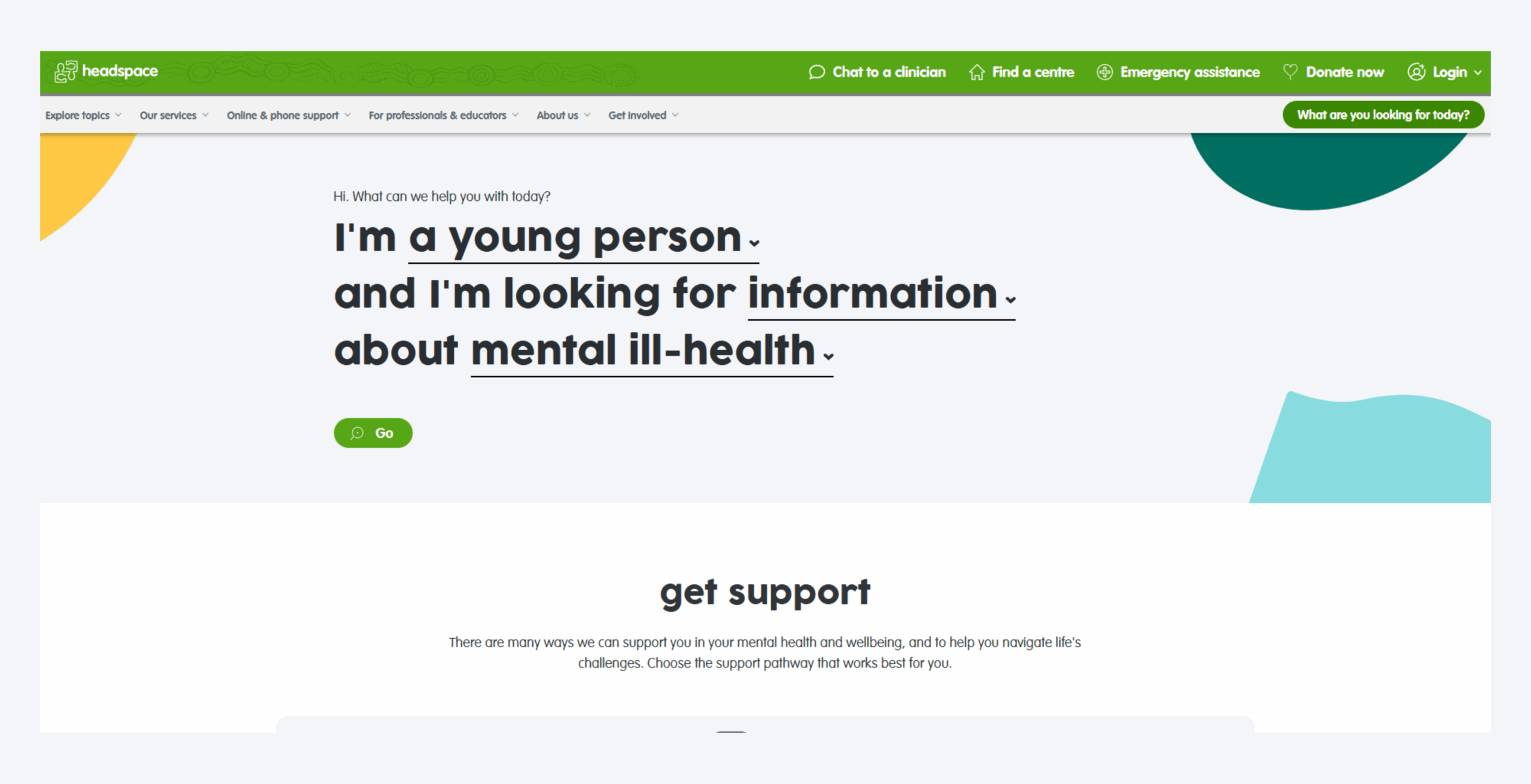Overview
Good mental health helps you to feel happy and enjoy life. It supports you to cope with problems and feel ready to learn and try new things.
Looking after your mental health is important at all stages of your life however from time-to-time life can be challenging and this can make it hard to know how to cope.
Different experiences like changing schools, losing someone you love, being bullied, or changes at home can be difficult to cope with and can have an impact on your mental health and wellbeing. You may start to feel not quite like yourself anymore, experience sadness, feel overwhelmed or find it difficult to relax. It is normal to feel this way sometimes however if these feelings continue it is important that you look after yourself and speak to somebody about how you are feeling.
Supporting Yourself
Sometimes it can feel uncomfortable talking about how you are feeling or asking for help but not doing anything at all can make you feel a lot worse later. If you aren’t quite ready to speak to someone you know there are a number of anonymous online support services available.
Staying connected and talking about how you are feeling is important however there are other things you can do to look after your mental health.
Eat well:
Let’s talk about food. Food is your body’s fuel and eating well plays an important role in looking after your brain, improving your energy levels, and regulating your mood. As a bonus, eating the right food can also help in the prevention and treatment of physical and mental health issues.
If you aren’t quite sure what foods are best for your body speaking to a nutritionist or dietician can be helpful.
And don’t forget to drink plenty of water. If you aren’t staying well hydrated you may experience headaches, feel low in energy, feel thirsty often or have difficulty concentrating.
Sleep:
Making sure you are getting enough sleep is important. Consistent good quality sleep has been shown to have physical, cognitive, and emotional benefits such as helping you to stay focused throughout the day, improving your mood, and restoring your energy.
Not getting enough sleep can make you feel tired and cranky, lose motivation, and become forgetful. And in the long term, lack of sleep can impact any feelings of stress or symptoms of anxiety or depression that you may be experiencing.
It is important to set healthy sleep habits for yourself. Here are a few suggestions to help you have a good night’s sleep.
- Get active, a little exercise each day can help you to use up any extra energy.
- Avoid drinking caffeinated drinks before bed. Replace these with a warm glass of milk or a decaffeinated tea.
- Limit your screen time before bed. Let’s be real you probably have a mobile phone or device in your bedroom at night, and it is easy to get caught up scrolling online or binge-watching your favourite program. If you are having trouble getting to sleep, try to turn off your screen at least 60 – 90 minutes before you plan on going to bed. You could use this time to read a book or magazine, write in a journal or take a warm shower.
- It may sound like an obvious one but go to bed when you feel tired. Don’t force your body to stay awake longer than it wants to but also don’t go to bed when you aren’t ready. Listen to your body.
- Listen to guided meditation. There are plenty of apps that can help with focusing on breathing and relaxation both of which are great for unwinding and settling in for the night.
Exercise:
Staying active can have great health benefits to your body not only physically but socially and mentally too.
It may come as a surprise, but regular physical exercise helps to give you energy. It’s also a great way to manage stress and feelings of depression as well as help you to get a good night’s sleep.
If you aren’t normally a physically active person simply doing 30 minutes of exercise a day is a great place to start. Try going for a walk with your dog, jogging, or swimming a few laps at the local pool after school a couple of times a week.
If you enjoy being around others, team sports are a great way to meet new people as well as support good physical health. If being in a group setting makes you feel anxious team sports can be confronting however being part of a team can help you to build confidence and make new friendships.
If you would prefer to start working on your fitness goals somewhere a little more private there are countless YouTube videos and apps available from step counters to workouts designed by personal trainers and fitness influencers.
Self-Talk:
Be kind to yourself. If you notice yourself thinking unhelpful thoughts or your inner voice has become negative and is getting you down take a moment, reset.
Ask yourself a few questions:
- Is thinking this way helpful? Is it making me feel good, angry or sad?
- Are my thoughts and what I am feeling based on facts or my interpretation of something that has happened?
- Do I think this way a lot?
- What can I do to help me solve the issue? Is there something I can change or learn?
- What makes me feel good? Going for a walk, listening to music, spending time with family or friends?
- Put pen to paper. Writing down thoughts and feels can provide a space for reflection.
Supporting another person
If someone close to you is experiencing a mental illness it can feel very confusing and worrying at times. Whether you have noticed a change in your parent, another family member, or a close friend remember that their becoming unwell is not your fault however there are a few things you can do to support them during this time.
Staying connected and talking about how you are feeling is important however there are other things you can do to look after your mental health.
Educate yourself:
Researching mental health conditions can help you understand a little more about what your loved one is experiencing. Mental health is quite complex and mental illness can impact people differently. Educating yourself and learning more about what signs to look for can be helpful not only to you but your loved one also.
Encourage the person to get help:
Supporting someone to get their mental health back on track is not entirely up to you. Letting your loved one know that you are there for them and are willing to learn with them can be helpful however it is also important to encourage them to seek help.
There are many services available to support people to improve their mental health and a great place to start is their General Practitioner (GP). Support offered by a GO can vary from discussing how they have been feeling, referring your loved one to a specialised health service, or in some instances, providing medication. However, it is important to remember that if you feel that you or your loved one is in immediate danger you should call emergency services on ‘000’.
Don’t forget about yourself:
It is great to encourage others to seek support but don’t forget about yourself. Services such as Kids Helpline and Headspace offer online and phone counselling services which can be helpful when you are supporting someone experiencing mental illness. If the person you are supporting
is your parent, Children of Parents with a Mental Illness also know as (COPMI) is a great resource where you can learn more about mental illness, supporting your loved one and getting advice from other young people who are going through the same thing.
Online Learning
How we can help
If you or someone you know is in crisis
If you are worried you may harm yourself or someone else, or need immediate help for someone else in this situation:
Please call 000If you are in distress
Other helplines
- Beyond Blue | 1300 22 4636
- Open Arms – Veterans & Families Counseling | 1800 011 046
- MensLine Australia | 1300 78 99 78
- Defence All Hours Support Line | 1800 628 036
- QLife | 1800 184 527
- 13YARN| 13 92 76
Please select a state you live in
Suicide Call Back Service. Free professional telephone counselling & online chat available at suicidecallbackservice.org.au
Available 24/7
1800RESPECT Domestic Violence Counselling & Support Line. Online Chat at 1800respect.org.au or SMS on 0458 737 732
Available 24/7
13YARN First Nations Peoples Crisis Support Line. Call to talk with an Aboriginal or Torres Strait Islander Crisis Supporter
Available 24/7
Defence All Hours Telephone Support Line. For Australian Defence Force (ADF) members and their families
Available 24/7
Health Direct. Speak to a registered nurse for healthcare advice. healthdirect.gov.au
Available 24/7
Beyond Blue. Online counselling, forums, and webchat - beyondblue.org.au
Available 24/7
Access Mental Health Line. For people who have concerns about their own, or someone else’s mental health
Available 24/7
Medicare Mental Health Centre Canberra. Phone, request a call canberrammhc.com.au.
Monday, Wednesday & Friday: 8.30am-5:00pm. Tuesday & Thursday (extended hours): 8:30am-7:00pm
NSW Hospital and Health Services State-wide Mental Health Line. Speak to a trained Mental Health Professional
Available 24/7
Medicare Mental Health. Phone to find your nearest centre. Support through Medicare Mental Health Centres are free. No appointment or GP referral is required. Visit www.medicarementalhealth.gov.au
Hours vary.
NT Mental Health Line. For people who have concerns about their own, or someone else’s mental health. Speak to a trained mental health professional.
Available 24/7
Darwin Medicare Mental Health. Clinical Assessment and Treatment. Call, walk-in (16 Scaturchio St, Casuarina.)
Mon - Wed and Fri: 9am - 9pm; Thur: 1pm - 9pm; Sat - Sun (and public holidays): 12pm - 8pm
13 HEALTH. A confidential phone service that provides health advice. Call to talk to a registered nurse.
Available 24/7
1300 MH Call. A confidential mental health telephone triage service providing information, advice and referral.
Available 24/7
Medicare Mental Health. Phone to find your nearest centre. Support through Medicare Mental Health Centres are free. No appointment or GP referral is required. Visit www.medicarementalhealth.gov.au
Hours vary.
SA Mental Health Triage. A confidential mental health telephone service, staffed by mental health clinicians, providing information, advice and referral.
Available 24/7
Urgent Mental Health Care Centre (UMHCC) located at 215 Grenfell Street, Adelaide, offers an alternative to presenting at hospital Emergency Departments for a mental health crisis.
Available 24/7
Medicare Mental Health. Phone to find your nearest centre. Support through Medicare Mental Health Centres are free. No appointment or GP referral is required. Visit www.medicarementalhealth.gov.au
Hours vary.
LETSS Lived Experience Telephone Support Service (Adelaide Metro). letss.org.au
5pm - 11:30pm, 365 days a year
Access Mental Health- Helpline Triage offering phone counselling, information and referral.
9am - 10pm
Medicare Mental Health. Phone to find your nearest centre. Support through Medicare Mental Health Centres are free. No appointment or GP referral is required. Visit www.medicarementalhealth.gov.au
Hours vary.
Victoria Psychiatric Triage providing an initial assessment and identifies whether a person needs further assessment or referral.
Available 24/7
Geelong Head to Health. Call or walk-in at 8 Station Street, Norlane.
Monday–Friday, 12pm–9pm and Saturday–Sunday/public holidays, 1pm – 6pm
Medicare Mental Health. Phone to find your nearest centre. Support through Medicare Mental Health Centres are free. No appointment or GP referral is required. Visit www.medicarementalhealth.gov.au
Hours vary.
Rurallink - An after-hours telephone service for people in rural and regional WA experiencing a mental health crisis
Weeknights 4:30pm-8:30am / 24hrs on Weekends and Public Holidays
Peel -Mental Health Emergency Response Line. Call to speak with a trained mental health clinician. Callers referred to acute response teams.
Available 24/7
TTY - Mental Health Emergency Response Line.Call to speak with a trained mental health clinician. Callers referred to acute response teams.
Available 24/7
Metro - Mental Health Emergency Response Line. Call to speak with a trained mental health clinician. Callers referred to acute response teams.
Available 24/7
Medicare Mental Health. Phone to find your nearest centre. Support through Medicare Mental Health Centres are free. No appointment or GP referral is required. Visit www.medicarementalhealth.gov.au
Hours vary.
Please select a state you live in
Service Options
**** *****
**** ***** * *********** *********** ***
**** ***** ********* *****
**** ***** * *********** *********** ***
**** ***** ********* *****
**** ***** * *********** *********** ***
**** ***** ********* *****
**** ***** * *********** *********** ***
**** ***** ********* *****
**** ***** * *********** *********** ***
**** ***** ********* *****
**** ***** * *********** *********** ***
**** ***** *****




